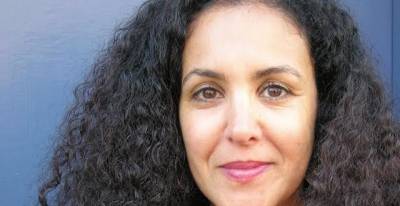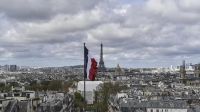Khadija Fajry, an immigrant to both France and the US, likens nascent cosmetic industry to a goldrush in which she offers 'the real thing'.
Little brown bottles filled with Moroccan argan and prickly pear seed oil dot Khadija Fajry’s table at a Long Island City street fair in the multiethnic enclave of Queens, New York.
Her business, Kenza International Beauty, is one stand among many. Italian ice, drunk with sweet syrup, is scooped out nearby and neighborhood establishments perform all around – from Irish folk dancing children to CrossFit gym rats, a group of muscular women wearing tiny shorts (some in high heel sneakers), who dramatically hoist barbells above their heads.
Wearing a long red silky blouse over crisp white pants, Fajry greets prospective customers warmly, and is soon massaging samples of her oils into the back of their hands or into the dry frizzy ends of their hair. Her own hefty mass of dark curls shimmer in the sunlight from the day’s excess oil she’s wiped into her hair.
Cosmetic oils might conjure up images of a blindingly slick face or grease-stained pillows for those accustomed to creams, but pure argan and prickly pear seed oil are absorbed within seconds, says Fajry.
“It’s literally food for your skin and your hair,” says Fajry in a vaguely French accent; she notes the oils are loaded with vitamin E and fatty acids. Kenza’s 1-2oz bottles of oils sell for $30 to $77.
Fajry founded Kenza in 2012 as an internet business that sells 100% USDA organic Moroccan oils. Fajry had moved to the US to be with her husband in 2000, then began noticing Moroccan argan oil beauty products flooding New York City stores and cosmetics websites.
“People got crazy over it. And when you see the product, there is nothing to get crazy about,” says Fajry flatly, “this is crap.”
Products were either mixed with chemicals or of low quality, easy to spot because the oil is slimy. She took it personally.
“When you look at the ingredients,” says Fajry singling out Moroccan Oil, the wildly popular hair product line that uses argan oil, “it’s really sick.”
Moroccan Oil Treatment oil is one of the most popular products, but its devout following could have silken tresses not from hydration but because of its first its two ingredients, cyclomethicone and dimethicone, which are forms of silicone. Fajry also noticed an business opportunity because no one was selling prickly pear seed oil, an exquisite cosmetic oil popular in Morocco, now hot in Europe.
“I thought, ‘I have to do something, I’m Moroccan,’” recalls Fajry. “I have to bring them the real thing.”
Finding pure, high-quality wholesale Moroccan oils and a trustworthy supplier is challenging. The oils are expensive because the process is labor intensive.
Prickly pear seed oil is made from Moroccan cactus fruit seeds. Argan oil, cosmetic or culinary, is made from the kernel found inside the argan tree fruit, native to south-west Morocco, primarily a Berber region. The fruit is inedible except for goats who climb the gnarly tree branches to eat them. Women crack open the argan nut between stones to extract the kernel, which is then cold pressed.
European cosmetic companies began buying argan oil in the 1980s, and it’s now a big business. Fajry likens the industry to a gold rush, in which scams and fakes are plentiful. Sellers might mix sunflower seed oil with argan or make it in an unsanitary kitchen, and if argan oil has a bouquet of goat, it’s been made with the argan kernels taken from goats’ excrement after snacking on the fruits.
Fajry found supplier Said Azbane of the Casablanca based Les Labaratories Azbane, a large family-run cosmetics company.
Said Azbane is a tall skinny man with closely cropped graying hair and long lashes. His family is Berber and comes from the argan forest region. His interest in regulating the quality and labor practices of the argan oil business is both business and personal.
“We don’t have gas, we don’t have energy,” explains Azbane of Morocco, “we have only our people and our natural resources. We have so many aromatic plants and argan oil, which is only found in Morocco.”
After hearing rumors about possible argan tree plantings in Israel and Mexico, Azbane helped register argan oil as a Protected Geographical Indication (PGI) the first in all of Africa. The designation ensures various foods originate from a specific region.
“I wanted to get the highest quality that is certified, verified, everything!” says Fajry, noting he had all the correct certifications. He was reluctant to work with a tiny startup, but he recognized her sincerity and liked that she was Moroccan. Moroccan Oil, by contrast, was founded by no Moroccans; their products are produced in Israel and the company is headquartered in the US, as is the company of American model Josie Maran, who created an argan oil makeup line that sells at cosmetics superchain Sephora.
Moroccan oils have a built-in socially responsible business structure that appealed to Fajry. For more than a decade, oils have been made in female-owned and run co-operatives, funded in part by foreign and domestic governments, NGO’s, and grants. The co-operatives are designed to give poor women in remote regions who are uneducated, even illiterate, financial independence. However some co-operatives are legitimately female-run and -owned; others are not.
“Sketchy” is how Ainslie Koopmans, the co-founder of the Vancouver, Canada based argan oil company Saadia Organics describes the co-operatives, which are popular with photograph-taking tourists. Over a two-week visit, Koopmans found only one authentic female owned and run co-operative.
The others had men roaming around, which to Koopmans was a bad sign. “Men will very proudly tell you about how strong their capitalist structure is,” reports Koopmans. “And how – we say exploiting – but there, they say how well their women are working for them. It’s a real source of pride. If you were to talk like that here, you’d have women picketing outside your shop!” exclaimed Koopmans, “They don’t get that that’s not a thing to be proud of.”
Fajry buys her oil from legitimate female-owned and -run co-operatives. She also says she donates 10% of her sales to two New York City non-profits, the New York Women’s Foundation and Turning Point, which focuses on helping Muslim women and children.
Integrating into American culture as an adult was easy for Fajry, now 44-years-old, compared to French culture as a child. Her family immigrated to Istres, a small town in southern France, because her father found work painting bridges and other structures. Typical of many immigrant kids who quickly learn the new language, she was soon in a leadership role, taking care of family paperwork and doctor visits.
Although traumatizing at the time, Fajry credits her first immigration to making her adaptable and fearless. She was encouraged to get an education by her parents; her father has never learned to read or write because he had to work as a child.
A socially responsible business is important to Fajry, even if she makes the tiniest contribution. “You can have all the money, and not be happy,” says Fajry. She grew up seeing her parents, who were not wealthy, help relatives in Morocco when they visited over summers. “It is so satisfying to see you can do that,” says Fajry.
This article was originally published in the Guardian. All rights reserved.










